Key takeaways:
- Privacy advocacy is essential for empowering individuals to control their personal information and raise awareness about privacy rights.
- Resilience is crucial for advocates to overcome challenges and setbacks, fostering community strength and collaboration.
- Navigating complex regulations and the rapidly changing technological landscape are significant challenges faced in privacy advocacy.
- Building resilience involves reflection, networking, and self-care, enabling advocates to sustain their commitment and effectiveness.

Understanding privacy advocacy
Privacy advocacy is all about protecting individuals’ rights to control their personal information. I remember my first encounter with a privacy breach; it felt like a violation of my personal space, similar to someone reading my diary without my permission. This experience ignited a fire in me to understand how advocacy could empower individuals to reclaim their privacy.
When I think about privacy advocacy, I often ask myself: what does true privacy mean in our increasingly digital world? For many, privacy is not just about secrecy but about having agency over one’s own data. The emotional weight of knowing that your personal details are vulnerable can be overwhelming, which is why advocacy is crucial. It’s about giving people a voice and ensuring they are equipped with the knowledge to protect themselves.
In this landscape, advocates play a vital role in educating the public and influencing policy changes. I’ve seen firsthand how powerful grassroots movements can be, driving awareness and sparking dialogue among community members. The path to effective privacy advocacy is not easy, but it’s incredibly rewarding when individuals start to realize their power to influence change. Isn’t it inspiring to think about the collective strength we can wield?
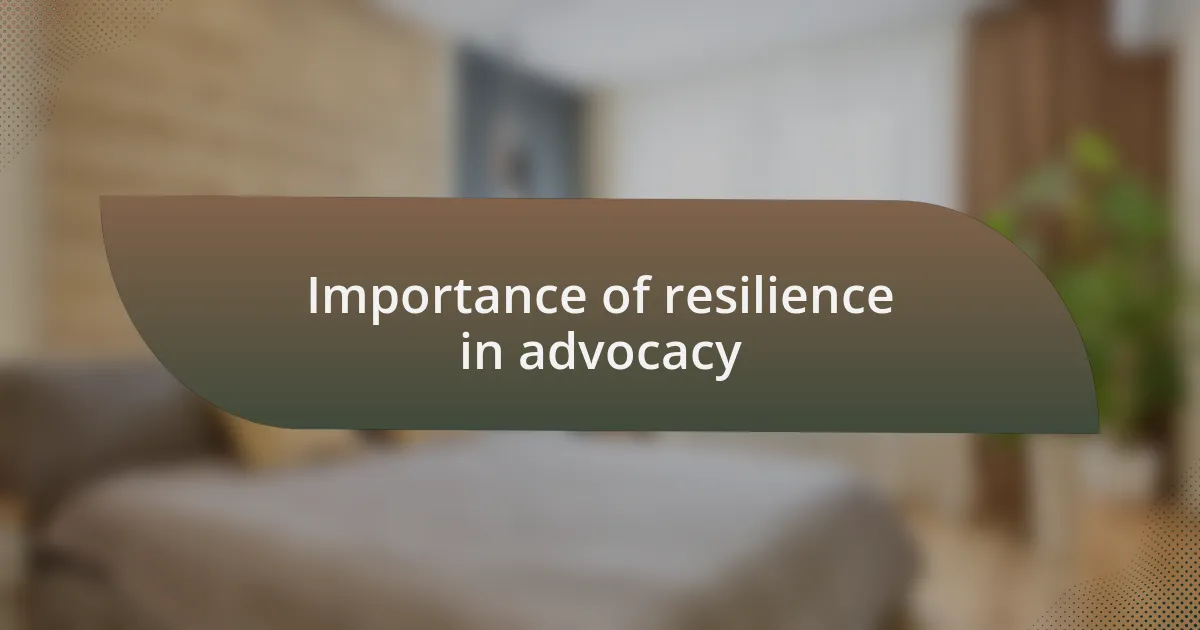
Importance of resilience in advocacy
Resilience in advocacy is essential, especially when facing setbacks. I remember rallying for a significant privacy reform, only to watch it get sidelined by political maneuvering. It was disheartening, but that experience reinforced my belief that persistence is key; our voices may falter, but they must not fade.
Moreover, the landscape of privacy advocacy is ever-evolving, filled with challenges that require advocates to adapt and remain steadfast. I often reflect on the backlash many advocates face—ambiguous accusations or pushback from powerful interests can be discouraging. Yet, it is precisely during these tough moments that resilience shines; it nurtures a determination to push through obstacles and champion the rights of those who cannot advocate for themselves.
Building resilience doesn’t just help advocates endure tough times; it also inspires others to join the cause. I once shared my story of overcoming challenges in the advocacy realm during a community meeting, and it sparked a lively discussion. This made me realize how vital it is to demonstrate perseverance—it invites collaboration and ignites a collective commitment to make real change happen. How can we expect others to join us if we don’t exhibit the tenacity needed to fuel the movement?
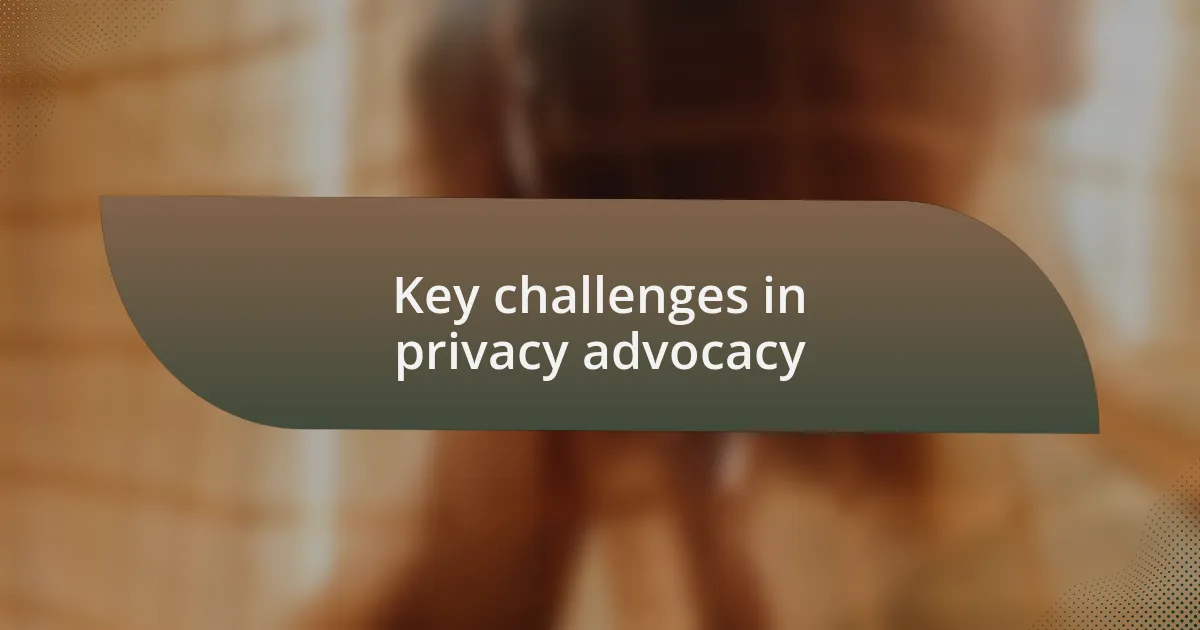
Key challenges in privacy advocacy
One major challenge in privacy advocacy is navigating the complex web of regulations and laws. I recall a time when I delved into a new set of GDPR regulations in Europe, trying to understand how they impacted our efforts. It felt like learning a new language—one riddled with loopholes and intricacies that could easily sideline our initiatives. How can anyone effectively advocate for privacy rights if the very laws meant to protect them are so convoluted?
Additionally, the technological landscape can change overnight, presenting another hurdle for advocates. For instance, after a significant data breach event, I felt an immense pressure to respond quickly to the community’s concerns, but the fast-paced changes in tech made it difficult to formulate a solid stance. How do we ensure that we’re not only keeping up with innovations but also understanding their implications for privacy rights? This constant shift can create a feeling of inadequacy, leaving advocates scrambling to catch up rather than leading the charge.
Finally, there’s the emotional toll of advocacy itself. I often find myself grappling with the fear of burnout, especially when faced with relentless opposition. During one particularly tough campaign, I spent countless hours drafting emails and organizing rallies, only to encounter discouraging responses. It was during those nights, lying awake, that I wondered: is this constant fight worth it? Yet, it’s that very pain and perseverance that fuel my passion, reminding me that resilience isn’t just about pushing through—it’s about igniting a fire within us to continue the quest for privacy rights.
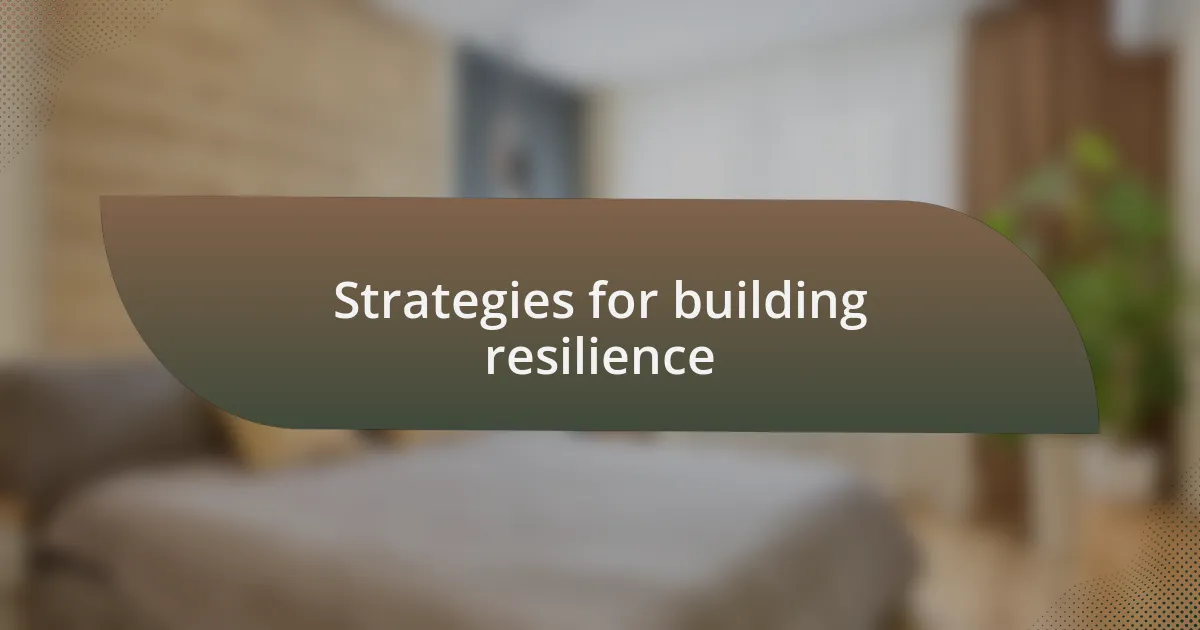
Strategies for building resilience
Building resilience in advocacy is not just about toughening up—it’s about cultivating a mindset that embraces both challenges and triumphs. For instance, I’ve learned the power of reflection after completing a particularly taxing campaign. Sitting down with a cup of tea, I often write about what worked and what didn’t. This reflective practice has not only helped me identify areas for improvement but has also reinforced my commitment to the cause. Isn’t it fascinating how turning setbacks into learning experiences can empower us?
Networking is another strategy that has proven invaluable in my advocacy journey. I remember attending a small conference where I met fellow advocates who shared their struggles and victories. The camaraderie was uplifting; it reminded me that I was not alone in this fight. Engaging with others who face similar hurdles can provide new perspectives and strategies, making us all stronger. How can we harness the strength of our community to bolster our resilience?
Lastly, it’s essential to carve out time for self-care amid the rigors of advocacy. I’ve often neglected this aspect, thinking it was a sign of weakness. However, after experiencing one too many sleepless nights fueled by stress, I realized that rejuvenating my mind and body was crucial for effective advocacy. Whether it’s through exercise, meditation, or simply enjoying a favorite hobby, prioritizing self-care equips us with the energy and clarity we need to continue championing privacy rights. How can something as simple as taking a break transform our ability to advocate?
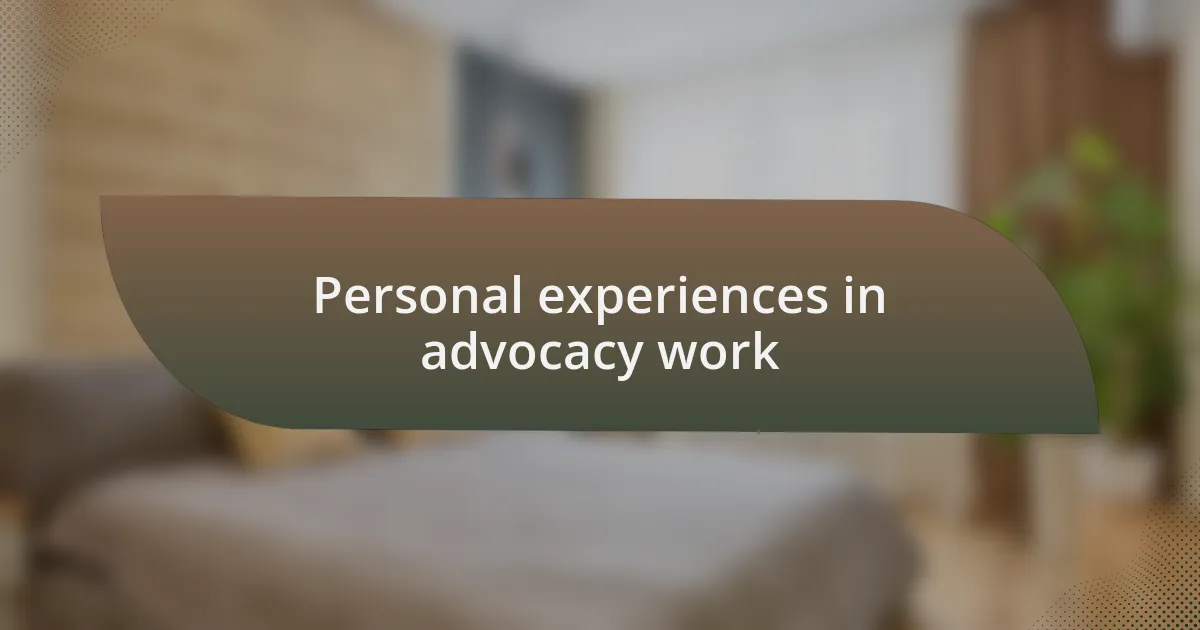
Personal experiences in advocacy work
In my advocacy work, I faced a moment that deeply tested my resolve. During a major campaign focused on privacy legislation, I received pushback that felt overwhelming. Instead of retreating, I began to share my experiences with others in the community. I discovered that vulnerability can be a strength, revealing the human side beneath the abstract legal debates. Have you ever felt that weight lift when you open up about your struggles?
One particular instance stands out in my memory—it was during a heated public forum where I spoke about the importance of transparency in data use. As I delivered my message, I could see the skepticism on some faces. Yet, one person approached me afterward, expressing how my words resonated with their own fears about privacy. That connection turned a solitary struggle into a shared mission. Isn’t it incredible how a single conversation can reignite our passion for advocacy?
I’ve come to appreciate the little victories along the way. For instance, I still remember the day I received a thank-you note from a family who felt more knowledgeable about their privacy rights after my workshop. That moment reaffirmed the impact of my work, no matter how small it seemed. How can these small, meaningful gestures fuel our commitment to the cause? Each experience builds a mosaic of resilience that sustains us in our advocacy journey.
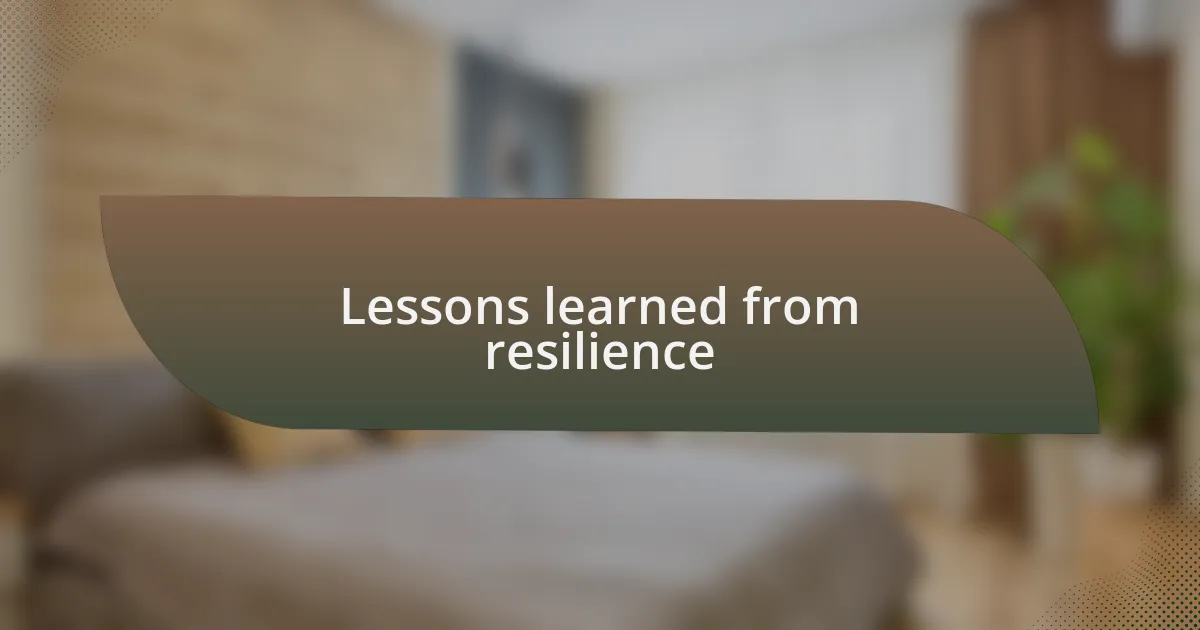
Lessons learned from resilience
Resilience in advocacy teaches us that setbacks are often stepping stones rather than obstacles. I remember a particular campaign where a significant proposal I championed failed to pass. Initially, disappointment washed over me, but as I reflected on the support and passion I witnessed from my peers, I realized that failure had ignited a deeper commitment within us all. How can we harness those moments of adversity to fuel our future efforts?
Throughout my journey, I’ve recognized the power of adaptability in fostering resilience. In one case, I facilitated a discussion group that pivoted after realizing that our original agenda wasn’t resonating with attendees. We adjusted our focus to address their immediate concerns, and the turnout was fantastic! It taught me that listening and adapting can lead to stronger engagement and more profound connections. In what ways can we be more flexible in our approach to advocacy?
Finally, I’ve learned that resilience is rooted in community. When going through tough times, I found strength in the friendships I formed with fellow advocates. After one particularly demoralizing event, a friend reached out, reminding me of the shared vision we were working towards. That moment reinforced the idea that we uplift each other, and it’s these connections that bolster our strength. Can we prioritize building those meaningful connections to foster resilience in our advocacy efforts?